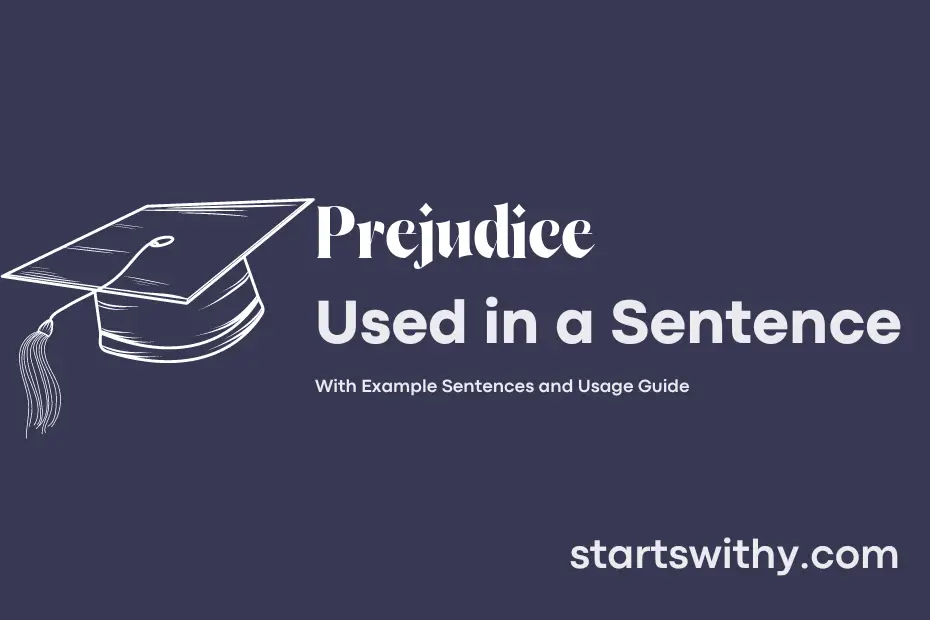Prejudice, a term often heard in discussions surrounding discrimination and bias, refers to preconceived notions or judgments about individuals or groups based on stereotypes rather than actual evidence. It can manifest in various forms, including racism, sexism, ageism, or homophobia.
Prejudice often leads to unfair treatment, marginalization, and inequality for those who are its targets. It is crucial to challenge and dismantle these harmful beliefs to foster a more inclusive and just society.
7 Examples Of Prejudice Used In a Sentence For Kids
- Prejudice is when we judge someone without knowing them.
- We should always be kind to others and not have prejudice.
- It is important to treat everyone with respect, regardless of any prejudice.
- We should try to learn about different cultures and not have prejudice towards them.
- We should always remember that it is not right to have prejudice against others.
- Having prejudice can hurt someone’s feelings, so we should always be kind.
- Let’s all work together to stop prejudice and be friends with everyone.
14 Sentences with Prejudice Examples
- Prejudice based on someone’s college major can hinder opportunities for students to explore their passions.
- As college students, it’s important to challenge prejudice towards individuals from different states in India.
- Being open-minded can help combat prejudice against students belonging to marginalized communities on campus.
- Prejudice towards a specific gender can create a toxic environment for students in academic settings.
- College students should actively work to dismantle prejudice based on someone’s religion or beliefs.
- It’s crucial for students to speak up against prejudice directed at individuals from different economic backgrounds.
- Prejudice against students who do not speak a certain language can lead to exclusion and segregation on campus.
- Students should educate themselves to avoid prejudice towards individuals with disabilities in academic environments.
- Addressing prejudice towards international students can help create a more inclusive campus culture.
- College students should engage in discussions to combat prejudice based on caste or social status.
- Prejudice can affect the mental health and overall well-being of students on campus.
- Promoting diversity and inclusion can help reduce prejudice against students from diverse backgrounds in higher education.
- Students should actively challenge prejudice towards individuals with different sexual orientations or gender identities.
- It’s important for college students to recognize and challenge their own prejudice towards students with varying academic abilities.
How To Use Prejudice in Sentences?
To use Prejudice in a sentence, start by identifying a situation where a preconceived opinion affects someone’s judgment. For example, “She faced prejudice when applying for the job because of her ethnicity.” In this sentence, prejudice refers to a biased attitude towards someone based on their ethnicity.
Alternatively, Prejudice can also refer to a negative attitude or feeling towards a group of people. For instance, “Their prejudice towards individuals with disabilities is evident in how they treat them.” Here, prejudice highlights the discriminatory behavior towards people with disabilities.
When using Prejudice in a sentence, it is important to provide context to convey the specific bias or discrimination being discussed. Avoid making generalized statements and instead focus on illustrating how prejudice influences attitudes or actions towards a particular person or group.
Remember to use Prejudice in a way that clearly showcases bias or unfair treatment based on preconceived notions. By choosing the right context and providing specific examples, you can effectively convey the meaning of prejudice in your sentences.
Conclusion
In conclusion, prejudice is a damaging mindset that can lead to unfair treatment or judgment of individuals based on preconceived notions or stereotypes. Examples of sentences with prejudice include: “She was denied opportunities due to the prejudice of her boss,” “His sentences were laced with prejudice, revealing his biased beliefs,” and “The prejudice directed at him made it difficult for him to feel accepted.” These samples highlight the negative impact of prejudice on both personal and professional interactions, underscoring the importance of combating such biases through awareness, education, and empathy. Overcoming prejudice is crucial for fostering a more inclusive and accepting society where individuals are judged based on their actions and character rather than unfounded assumptions.



